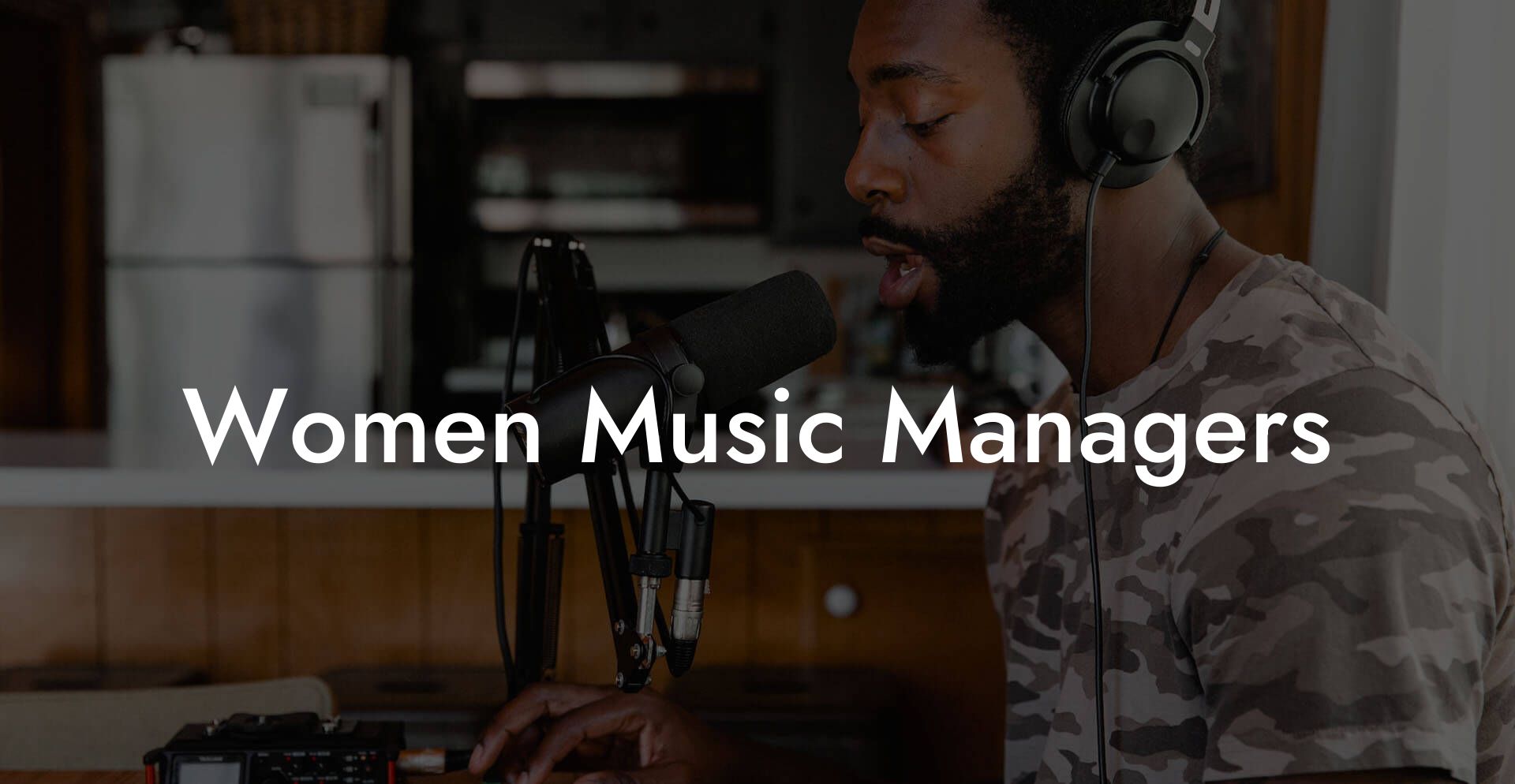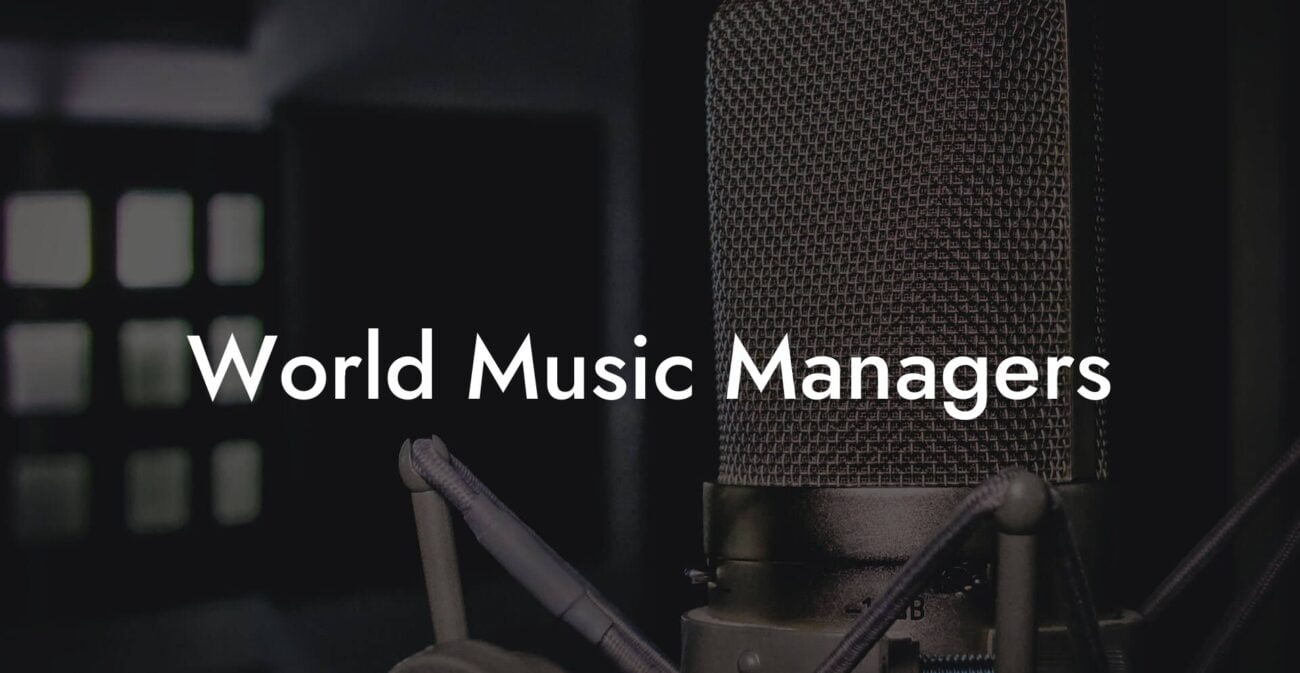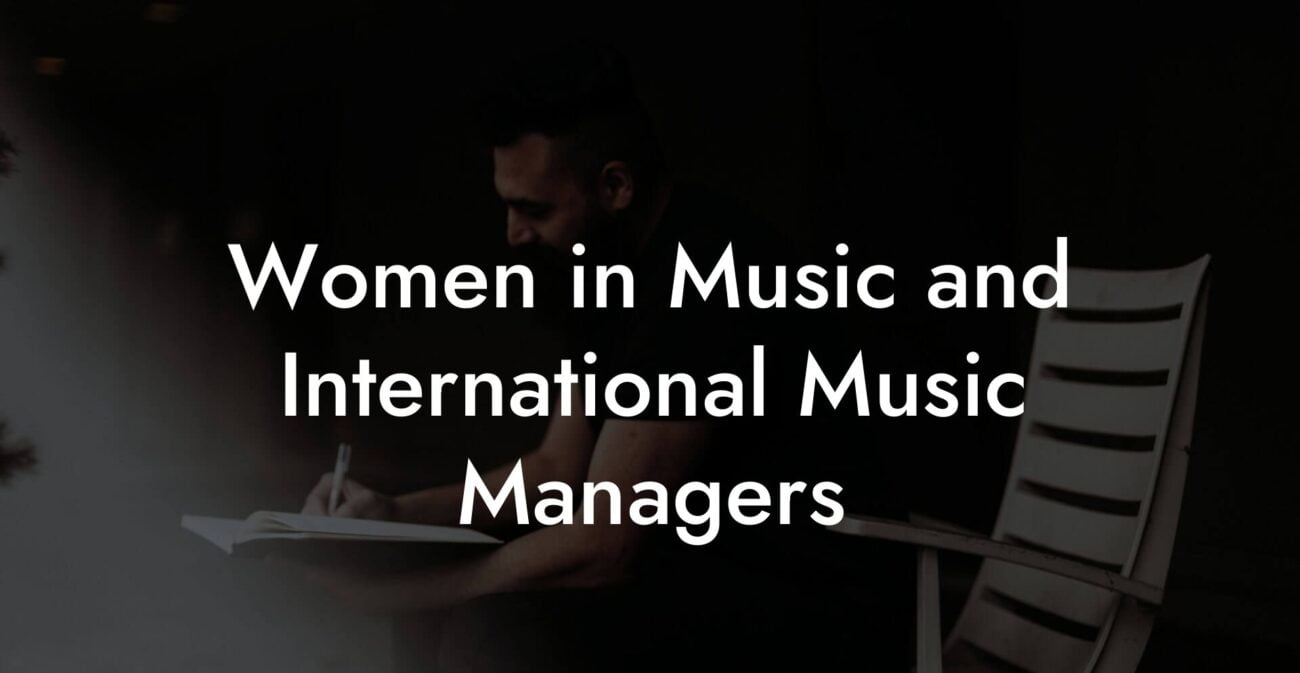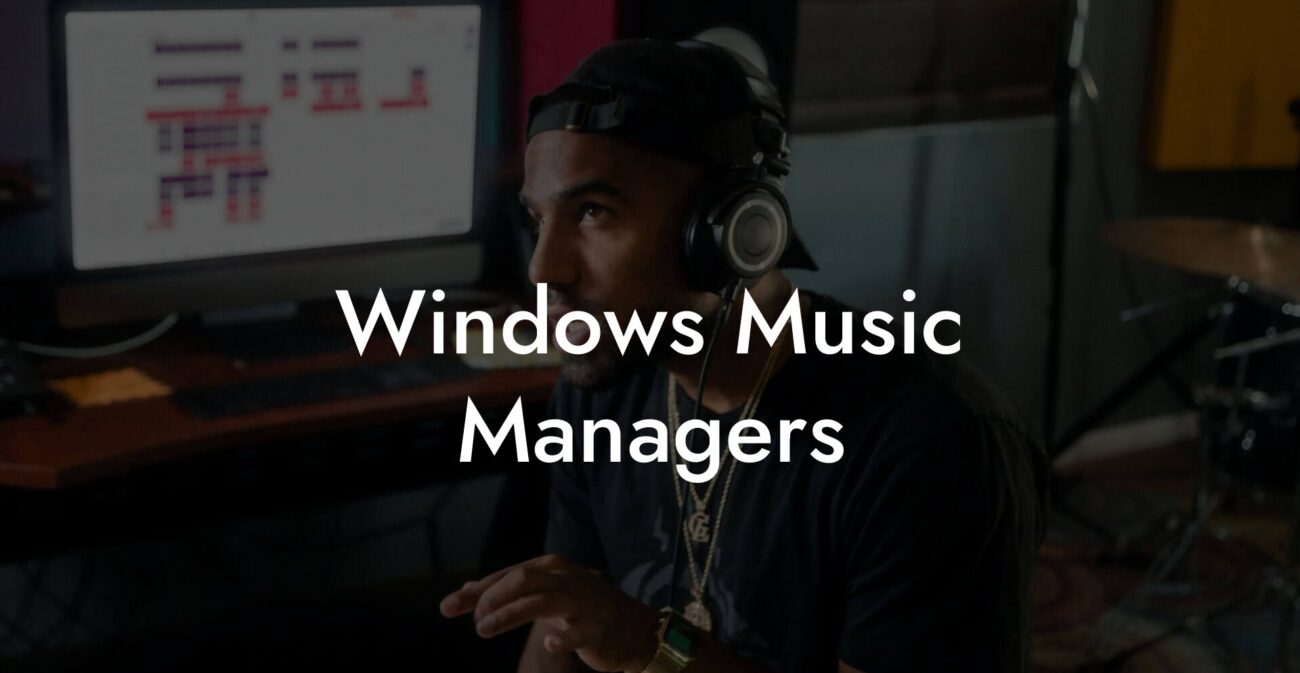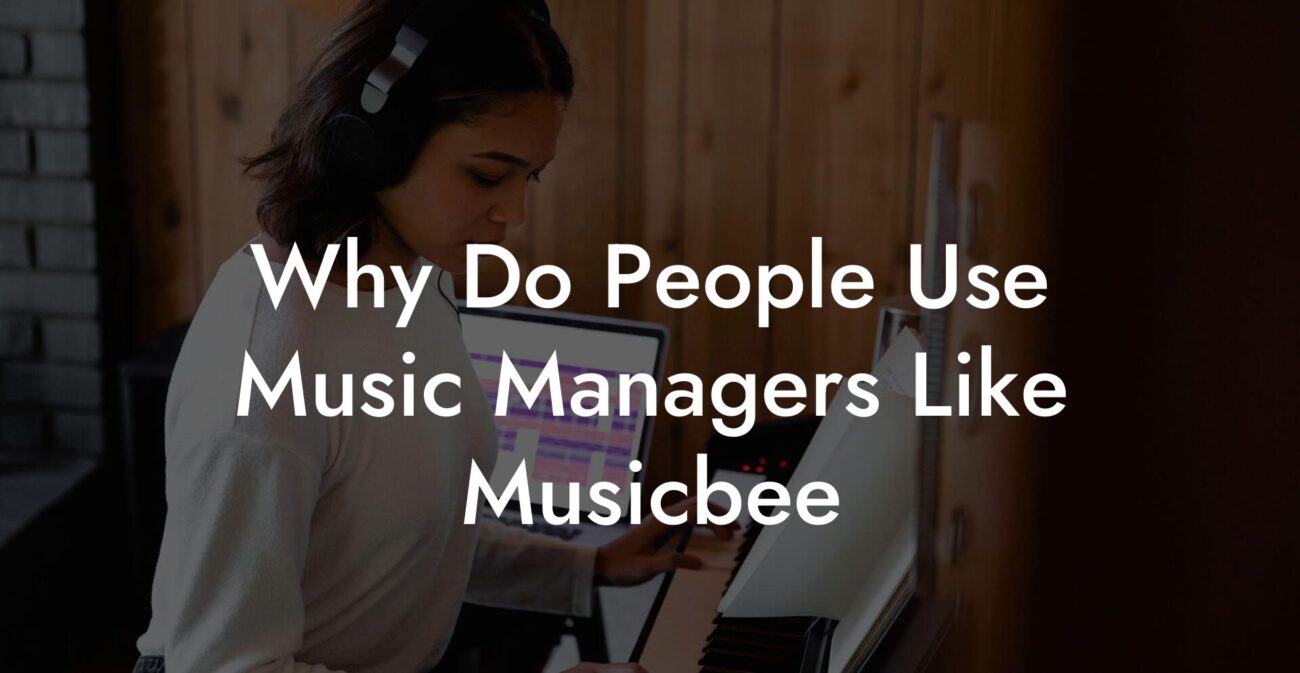Have you ever dreamed of a world where fierce, creative women not only write the tunes but also command the stage behind the scenes? Welcome to the dynamic universe of Women Music Managers—a realm where passion meets strategy, creativity dances with business acumen, and the bold spirit of modern music meets innovative leadership. If you’re a songwriter, an aspiring musician, or simply a music lover who believes that behind every unforgettable track is a powerhouse manager making the magic happen, you’re in for an exhilarating ride.
Looking to write your next song? Transform your creative ideas into songs that people will love, and skyrocket your music career with Lyric Assistant. The perfect songwriting assistant. Find out more →
Quick Links to Useful Sections
- Discovering the Magic: Who Are Women Music Managers?
- The Evolution of Women in Music Management
- Breaking the Glass Ceiling: Women Who Dare to Lead
- A Day in the Life: The Multifaceted Role of Women Music Managers
- Navigating the Modern Music Scene: Balancing Business and Artistry
- The Digital Revolution and Its Impact on Women Music Managers
- Championing Diversity and Inclusion in the Music World
- Strategies and Essentials for Aspiring Women Music Managers
- 1. Build Your Network Early
- 2. Embrace Technology and Analytics
- 3. Master Negotiation and Communication
- 4. Stay True to Your Vision
- 5. Continuously Educate Yourself
- Building Lasting Relationships: Networking and Collaboration
- Utilizing Modern Tools: How Tech Amplifies the Art
- Empowering Songwriters: The Role of Women Music Managers in Creative Production
- Resources and Community Support: Your Next Steps
- Charting a Course for Future Success in Music Management
- Frequently Asked Questions About Women Music Managers
- Embrace Your Future: Take Charge of Your Music Journey
Discovering the Magic: Who Are Women Music Managers?
In a field that was once dominated by old-school rulebooks and buttoned-up suits, Women Music Managers are rewriting the playbook. These trailblazers manage artists, negotiate deals, shape brands, and often play the role of confidante, mentor, and strategist all at once. They’re the unsung heroes ensuring that talent gets its due spotlight while staying true to its artistic soul.
Today’s music industry is more collaborative than ever. Women in management bring fresh perspectives and a balance of empathy, creativity, and relentless drive to an industry that thrives on innovation. Far from the stuffy corridors of outdated business models, these modern mavens merge art with analytics, blending personal vision with market savvy. Whether working independently or as part of a vibrant agency, they are key to shaping the sounds and stars of tomorrow.
What makes them stand out? For starters, women music managers often build environments where artists can experiment freely and express themselves, knowing a trusted advisor is always in their corner. Their roles extend far beyond booking gigs; they oversee marketing, branding, digital outreach, and even help harness the creativity of cutting-edge tools like Lyric Assistant to help musicians write lyrics for their next chart-topping hit.
The Evolution of Women in Music Management
Over the decades, the music management landscape has undergone an incredible transformation. Historically, music management was a boys’ club, with decisions often made behind closed doors by a handful of industry insiders. However, a seismic cultural shift in the past few decades has paved the way for a vibrant, diverse cast of women music managers who are not only wielding influence but are reshaping the rules of the game.
With the rise of digital media, social platforms, and innovative tech, the barriers to entry in the music world have crumbled. Today’s women music managers leverage digital marketing strategies, social media analytics, and data-driven decision-making to amplify their artists’ voices. This simultaneous blend of creativity and business intelligence is a testament to the evolving nature of the music industry, where the art form is as much about the beat as it is about the brand.
This evolution is particularly evident in the way these managers handle everything from artist development to global tour planning. They thrive on challenges, taking risks that others might shy away from, and their successes ripple across the industry, championing diversity and inclusion every step of the way.
Breaking the Glass Ceiling: Women Who Dare to Lead
The journey to the top is rarely a smooth ride. Women music managers have battled stereotypes, overcome obstacles, and shattered glass ceilings to carve out their place in an industry that often seemed unyielding. Their stories are not just about personal triumphs—they’re about revolutionizing an entire sector.
Today, fierce female managers are not only succeeding; they’re mentoring the next generation of leaders. Their influence spans across genres, from indie rock to hip-hop and electronic dance music, proving that great talent and formidable management know no gender.
Their robust approach includes a masterful command of negotiation, a deep understanding of marketing trends, and an ability to inspire confidence in artists. This isn’t your typical boardroom management; it’s a passionate, sometimes gritty, always innovative pivot in how the music business is run, all while keeping an ear firmly on what resonates with a generation that values authenticity and impact over flash.
A Day in the Life: The Multifaceted Role of Women Music Managers
Imagine starting your day with a double espresso and an in-box full of strategic emails, scheduling conflicts, and creative briefs that require a dash of spontaneity. Women music managers wear many hats throughout the day—from counselor to publicist, from dealmaker to digital strategist. Their daily agenda reads more like a playlist of diverse hits than a monotonous schedule.
In the morning, you might find them huddled in a brainstorming session with an up-and-coming artist, fine-tuning lyrical ideas with the help of cutting-edge software like Lyric Assistant, ensuring that every word resonates with raw emotion and clarity. As the day unfolds, negotiations with record labels, sponsorship deals, and media interviews all come into play with a fine balance of finesse and bold decision-making.
Afternoons may be filled with planning tours, analyzing digital engagement metrics, or curating content that tells a compelling story for the artist. Evening events, from industry mixers to exclusive listening parties, serve as both networking opportunities and stages to unveil groundbreaking initiatives. The life of a music manager is dynamic and requires not just a keen eye for detail, but an unyielding passion for nurturing creativity in a fast-paced, ever-changing environment.
Navigating the Modern Music Scene: Balancing Business and Artistry
The beauty of today’s music scene lies in its perfect blend of art and commerce—a balance that women music managers have mastered with style. Gone are the days when business decisions were made in sterile, rigid meetings. Now, they’re part of an ongoing dialogue between creativity and analytics.
Modern music management is about striking the right chord between following current trends and paving the way for innovative expressions. It’s a realm where a compelling hook on a song is as important as a well-executed social media campaign. These managers are astute storytellers who craft narratives that not only elevate their artists’ brand but also create resonant connections with audiences.
Tools like Lyric Assistant are part of this new symphony—helping musicians write lyrics that capture the zeitgeist of our time, all while guided by the strategic vision of their managers. This synergy between art and business allows for creative freedom and commercial success to exist side by side.
The Digital Revolution and Its Impact on Women Music Managers
In today’s hyper-connected world, the digital revolution has redefined the rules of the music game. Social platforms, streaming services, and digital marketing have become essential instruments in an artist’s arsenal, and Women Music Managers are at the forefront of leveraging these tools.
With the click of a mouse, a manager can orchestrate viral campaigns, launch global tours, and coordinate with international talent, all while tracking precise metrics that determine success. The integration of platforms like Spotify, TikTok, Instagram, and emerging streaming technologies means that digital fluency is not optional—it’s a necessity. These women are masters at using data analytics and social media insights to track audience engagement, predict trends, and most importantly, tell the story of their artists in the most compelling way possible.
For instance, when a songwriter is struggling with crafting the perfect lyrical verse, Lyric Assistant steps in as the digital sidekick, suggesting wordplay and thematic ideas that align with current trends. This 21st-century synergy transforms a once archaic industry into a dynamic playground where creativity meets technology, and Women Music Managers are the virtuosos behind the scenes.
Championing Diversity and Inclusion in the Music World
One of the most powerful contributions of Women Music Managers is their unwavering commitment to diversity and inclusion. They understand that the sound of tomorrow is shaped by voices from every background, culture, and experience. These managers are actively pushing boundaries, creating platforms where underrepresented artists can share their stories and shine.
By fostering inclusive environments, these leaders are challenging the status quo. They seek out fresh talent from diverse backgrounds, ensuring that a breadth of perspectives is not only heard but celebrated. This commitment extends to every aspect of their work—from hiring practices within their teams to the creative direction of campaigns and tours.
Whether it’s organizing community outreach events or supporting charity initiatives, their leadership is anchored in the belief that music transcends barriers. In a world that thrives on collaboration, diversity is the key ingredient that fuels innovation and originality, making every campaign richer, more relatable, and ultimately more powerful.
Strategies and Essentials for Aspiring Women Music Managers
So, you have a burning desire to break into music management or take your career to the next level? Whether you’re fresh out of college or already working in the industry, here are some powerhouse strategies to help you get started:
1. Build Your Network Early
The music industry thrives on connections. Attend concerts, seminars, workshops, and even casual meet-ups. Every conversation is an opportunity—every introduction could lead to a breakthrough. And don’t forget: social media is a living, breathing network. Engage with industry professionals online, join music forums, and make your voice heard.
2. Embrace Technology and Analytics
Digital literacy is your golden ticket. Get acquainted with industry tools, data analytics, and platforms that monitor audience behavior. Tools like Lyric Assistant not only help with songwriting but also illustrate how technology can amplify creativity. Understanding the digital landscape will give you a competitive edge.
3. Master Negotiation and Communication
Whether it’s booking a tour or negotiating a record deal, strong communication skills are essential. Practice active listening, maintain a clear vision of your goals, and never underestimate the power of empathy. Balancing firmness with approachability is key to successful negotiations.
4. Stay True to Your Vision
In an industry as dynamic as music, trends can be fleeting. Always ground your work in a clear, authentic vision. Understand your artist’s identity deeply and make decisions that support their unique brand. Authenticity resonates with audiences and builds long-lasting relationships.
5. Continuously Educate Yourself
The world of music management is ever-evolving, so continuous learning is crucial. Attend industry conferences, subscribe to leading publications, and participate in online courses. Knowledge is empowerment—stay curious, and let every experience add a new note to your professional symphony.
Remember, every successful journey begins with the courage to embrace challenges and learn relentlessly. The strategies you put into practice today will be the foundation of tomorrow’s groundbreaking successes.
Building Lasting Relationships: Networking and Collaboration
At the heart of music management lies collaboration. It’s not just about signing the next big star—it’s about weaving a tapestry of relationships that enrich the entire industry. Women Music Managers excel at engaging with a diverse range of talents, industry influencers, and creative visionaries.
Networking in today’s digital era means more than exchanging business cards. It’s about nurturing genuine relationships that foster mutual growth, whether it’s through collaborative projects, mentoring programs, or informal meet-ups. These relationships are built on trust, shared visions, and the willingness to push creative boundaries.
By forging authentic connections, these managers provide their artists with access to invaluable resources—be it exposure to influential industry insiders, opportunities for cross-genre collaborations, or the chance to tap into fan-driven campaigns that elevate their brand. In essence, a strong network not only helps in career advancement but also in building a supportive community that champions artistic freedom.
Utilizing Modern Tools: How Tech Amplifies the Art
There’s no secret sauce to staying ahead in today’s musical world other than leveraging innovative technology. Modern tools can streamline operations, boost creativity, and offer insights that were unimaginable just a decade ago. For instance, a tool like Lyric Assistant can be your secret weapon in the studio—transforming a rough draft into a lyrical masterpiece with just a few taps.
But it’s not just about songwriting. Data analytics platforms, social media management tools, and collaboration software all play a pivotal role in shaping the modern music management toolkit. Women Music Managers are quick to adapt, integrating these digital resources to craft bespoke strategies that resonate with contemporary audiences, particularly millennials and Gen Z.
Whether it’s analyzing streaming data to command attention during a global tour or coordinating digital campaigns that bring a viral sensation to life, technology empowers these managers to turn creative vision into measurable success. Embracing these innovations doesn’t detract from the artistry; rather, it amplifies it, proving that in the fast-paced rhythm of today’s industry, every beat counts.
Empowering Songwriters: The Role of Women Music Managers in Creative Production
A successful artist is not forged in isolation—it’s the result of a powerful, symbiotic relationship between the creative genius and the visionary manager. Women Music Managers play a transformative role in guiding songwriters, offering not only business support but also creative inspiration and mentorship.
These managers understand that crafting a hit track requires both technical prowess and raw emotional depth. They work closely with songwriters to refine melodies, harmonize lyrical themes, and ensure that every note resonates with the intended audience. Leveraging tools like Lyric Assistant, these managers help streamline the creative process by providing innovative suggestions that preserve the authentic vibe of the song while opening up new avenues of lyrical exploration.
The result? A collaborative environment where creativity flows as freely as the latest trending beat—a space where every idea is celebrated and every challenge is an opportunity to evolve. By championing the artistic process, women music managers are not just shaping careers; they’re redefining the very art of songwriting.
Resources and Community Support: Your Next Steps
Ready to dive deeper into the world of music management? Whether you’re an aspiring manager, a budding musician, or a songwriter eager to amplify your craft, there are countless resources and vibrant communities waiting to support you.
Start by exploring online courses, podcasts, and webinars hosted by industry titans. Connect with communities on platforms like LinkedIn, Twitter, and specialized music forums where ideas bounce around like a catchy hook. Engage with mentor networks and local events to build relationships and gain insights from seasoned professionals who’ve navigated the ups and downs of the music industry.
Additionally, don’t overlook the power of hands-on practice. Experiment with digital tools like Lyric Assistant to enhance your songwriting and creative brainstorming sessions. These platforms are designed to help you overcome creative blocks and foster a seamless interplay between your artistic vision and strategic planning.
Embrace the journey with enthusiasm and a willingness to learn continuously. Whether it’s by joining collaborative projects, attending industry conferences, or simply connecting with like-minded professionals, every step you take propels you closer to creating a lasting impact in the music world.
Remember, the future of music is being written today by those who dare to innovate, inspire, and lead with passion. Your next steps are not just about career progression—they’re about joining a movement that celebrates creativity, breaks down barriers, and redefines what it means to manage music in a modern world.
Charting a Course for Future Success in Music Management
The roadmap to becoming a stellar music manager is less about following a rigid blueprint and more about designing a journey that is uniquely yours. Embrace the challenges, celebrate every win, and use setbacks as stepping stones toward creativity and success. In this ever-evolving industry, agility is as crucial as ambition.
Consider setting short-term goals—be it mastering a new digital tool, expanding your network, or simply learning from your peers. These incremental achievements add up, laying a robust foundation for long-lasting success. Complement your efforts by staying updated on the latest trends, following industry news, and continually evolving your skill set.
In doing so, you not only pave your own path but also contribute to a broader narrative. A narrative where visionary women redefine creative leadership, turning every challenge into an orchestration of opportunity. As you continue to innovate and inspire, you become a beacon for others to follow—a mentor, a trendsetter, and a leader who believes in the power of music to transform lives.
The future of music management is vibrant and full of potential. With the right blend of tech, talent, and tenacity, you can help sculpt an industry that champions originality, collaboration, and inclusivity. And remember, every great journey starts with one bold step. So, whether you’re refining a song lyric using Lyric Assistant or brainstorming your next big project, know that your ideas hold the power to change the rhythm of the world.
Frequently Asked Questions About Women Music Managers
Dive into our FAQ section below to find answers to some of the most common questions about Women Music Managers and the vibrant ecosystem they lead.
1. What exactly does a Women Music Manager do?
Women Music Managers handle a variety of tasks—from artist development and contract negotiations to digital marketing, tour scheduling, and creative consulting. They work to balance the artistic vision with business strategy, ensuring that each artist’s career flourishes in today’s competitive landscape.
2. How have women transformed the music management industry?
By introducing fresh perspectives, embracing digital innovation, and fostering inclusive environments, women have redefined the traditional roles associated with music management. Their collaborative approach and emphasis on authenticity are reshaping the industry’s playbook.
3. What challenges do Women Music Managers face?
Challenges can range from overcoming gender biases and breaking into established networks to balancing creative integrity with commercial demands. However, their resilience and innovative spirit have continuously propelled them forward.
4. How do Women Music Managers support songwriters?
They provide strategic guidance, creative mentorship, and technical support—often leveraging tools like Lyric Assistant—to help songwriters refine their craft and overcome creative blocks while navigating the complexities of the music industry.
5. What qualities make a successful Women Music Manager?
Key qualities include adaptability, strong communication skills, strategic thinking, digital fluency, and an innate ability to cultivate meaningful relationships. A passion for both music and innovation is essential to thrive.
6. Can aspiring music managers break into the industry without formal training?
Absolutely. While formal education can be beneficial, much of the industry’s knowledge is gained through hands-on experience, mentorship, self-education, and networking. Embracing digital tools and staying up-to-date with industry trends plays a huge role in success.
7. How does the digital revolution affect the role of Women Music Managers?
The digital era has broadened the scope of music management by providing access to real-time data, innovative communication platforms, and creative tools. This evolution allows managers to create viral content, engage with global audiences, and deploy data-driven strategies that enhance an artist’s reach.
8. Is it important for Women Music Managers to specialize in a particular genre?
Not necessarily. While some managers choose to specialize, many thrive by adapting their strategies to various genres. What’s most important is a deep understanding of the industry and the ability to tailor creative and business strategies to each artist’s unique sound.
9. Where can I find resources to learn more about music management?
There are plenty of resources available online, including industry blogs, podcasts, online courses, and networking events. Joining music forums and groups on social media can also provide valuable insights and mentorship opportunities.
10. What role does mentorship play in this field?
Mentorship is a cornerstone of success in the rapidly evolving music industry. Experienced Women Music Managers often guide emerging talents, sharing wisdom and practical insights that help newer professionals navigate the complexities of the business.
Embrace Your Future: Take Charge of Your Music Journey
The spirit of Women Music Managers is all about empowerment, creativity, and the relentless pursuit of excellence. As you stand on the threshold of your music journey—whether crafting lyrics with the help of innovative tools or stepping into the challenging world of management—know that you’re part of a powerful movement that reshapes the future of music.
Every piece of advice, every strategy, and every digital innovation is geared toward one thing: helping you transform creativity into a thriving career. In this realm, empowerment is measured by the courage to take risks, the determination to mentor others, and the passion to make meaningful connections.
So, let the rhythm of your ideas guide you. Embrace the challenges, learn continuously, and never stop pushing the boundaries of what’s possible. Your creative journey is just beginning—choose to stand tall, lead with authenticity, and let your passion for music break every barrier.
Grab the tools, immerse yourself in a supportive community, and let your inner entrepreneur shine. The future of music is here, and it’s being written by the bold and innovative. Your journey today is the legacy of tomorrow.
Now’s the time to step forward—create, manage, and inspire. The stage is set, and your breakthrough awaits!

